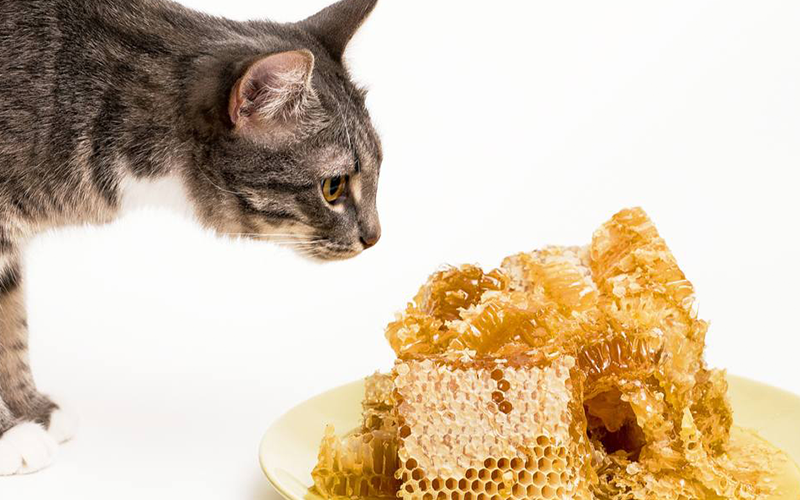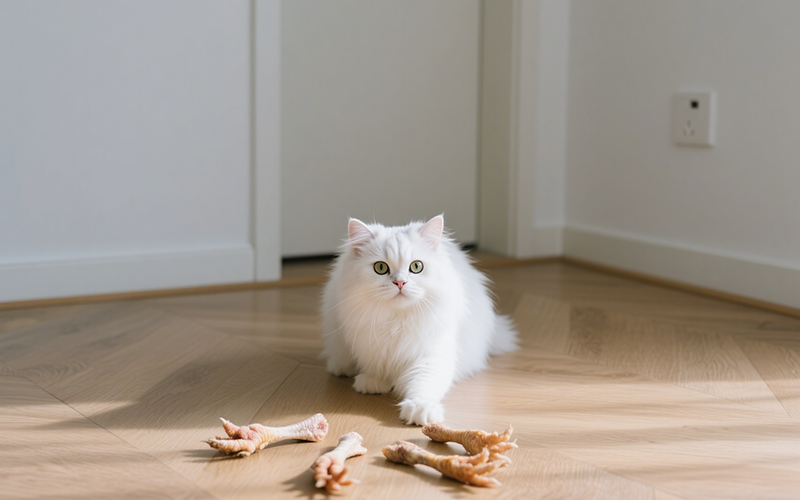Can Cats Eat Honey? A Guide to Honey and Your Cat’s Health
- 19 Feb 2025 11:36
Honey is a sweet and natural food that many humans enjoy for its flavor and potential health benefits. But when it comes to our feline friends, can cats eat honey? The answer is yes, but with caution. While honey is not toxic to cats, it’s important to understand how and when it should be offered to them.
Let’s dive into the potential benefits and risks of honey for cats, and how to safely share it with your feline companion.

Is Honey Safe for Cats?
In small amounts, honey is safe for cats to consume. It’s a natural substance and doesn’t contain any harmful ingredients that are toxic to felines. However, it’s important to note that honey is primarily made up of sugars, which means it should only be offered occasionally and in moderation.
Honey doesn’t have the same kind of immediate reaction on cats as it does on humans or other animals, so its effects are more subtle.
Potential Benefits of Honey for Cats
Mild Antibacterial Properties: Honey contains antibacterial properties, especially raw honey. If your cat has a minor wound, honey can be used topically (after consulting with a professional) to help with healing. However, it’s not necessary to feed honey to your cat for these benefits.
Natural Energy Source: Honey is a natural source of simple sugars, which can give your cat a mild energy boost. This can be helpful for very active cats or cats that need a quick pick-me-up.
Digestive Aid: Some cats may find honey helpful for soothing minor digestive issues like mild nausea or indigestion. However, this should be done in moderation, and if your cat has ongoing digestive problems, it’s best to seek professional advice.
Cough and Throat Relief: Honey has long been used as a home remedy for sore throats in humans. While it’s not a substitute for veterinary care, some owners may offer honey in small quantities to soothe their cat’s throat if they are coughing or experiencing mild discomfort.
Risks of Honey for Cats
Although honey is safe in small amounts, there are some risks to keep in mind:
High in Sugar: Honey is high in sugar, which can contribute to weight gain and diabetes if fed excessively. Cats do not need added sugar in their diet, so it’s essential to limit honey to small portions. Too much sugar can lead to long-term health issues like obesity and metabolic problems.
Potential for Stomach Upset: If your cat eats too much honey, they may experience mild digestive upset, such as vomiting, diarrhea, or gas. To prevent this, always feed honey in moderation and monitor your cat’s reaction.
Allergic Reactions: Although rare, some cats might be allergic to honey, especially if it contains pollen or other compounds that they may not tolerate. If your cat has never had honey before, introduce it slowly and watch for signs of itching, swelling, or hives.
Botulism Concerns: Just like with babies, you should avoid feeding raw honey to very young kittens (under six months old), as it can potentially contain botulism spores. These spores can cause botulism poisoning, which is a serious and potentially life-threatening condition. Stick to pasteurized honey for adult cats, and consult a vet if you have any concerns about raw honey.
How to Safely Feed Honey to Your Cat
If you decide to offer honey to your cat, follow these guidelines to ensure it’s safe:
Offer Small Amounts: Less is more when it comes to honey for cats. Offer only a small amount—a teaspoon or less for a full-grown cat—and monitor their response. A tiny dab is enough to enjoy the benefits of honey without the risks of overconsumption.
Pasteurized Honey: It’s safer to offer pasteurized honey, as this removes any potential harmful bacteria or botulism spores found in raw honey. Be sure the honey you give your cat is free of added sugars or artificial sweeteners, such as xylitol, which is highly toxic to cats.
Watch for Reactions: Introduce honey slowly into your cat’s diet and observe how they respond. If you notice any signs of an allergic reaction or digestive upset, discontinue use immediately.
Use Honey as a Treat, Not a Staple: Honey should be given as an occasional treat and not as a regular part of your cat’s diet. Cats thrive on a balanced diet that is high in animal-based proteins and low in sugars, so honey should only be an infrequent addition.
Avoid Processed Honey Treats: While there are many commercial treats with honey, these can be high in additives, preservatives, and extra sugar. It’s always best to give pure, natural honey without any extra ingredients.
How Much Honey Can I Give My Cat?
As mentioned earlier, moderation is key when it comes to honey. A teaspoon or less for a medium-sized adult cat is usually enough. This small amount won’t contribute significantly to their daily caloric intake or cause digestive issues.
For kittens, it’s best to avoid giving honey unless you have specific advice from a professional, especially in the case of raw honey.
Conclusion
Can cats eat honey? Yes, honey is safe for cats to eat in small quantities. It can offer some mild benefits, such as energy boosts, digestive relief, and antibacterial properties. However, due to its high sugar content, it’s important to feed honey sparingly and avoid overfeeding.
If you’re ever unsure about what foods are safe for your cat, or if you have concerns about their diet or health, PettureX is here to help. PettureX offers 24/7 online consultations with pet health assistants who can provide advice on keeping your cat healthy and safe. Stay informed and give your cat the best care possible with PettureX!
Related

Can Cats Eat Egg Yolk Raw? A Vet's In-Depth Guide to Feline Nutrition & Safety
- 10 Jun 2025
Can Cats Eat Dog Kibble? Unpacking the Nutritional Mismatch!
- 29 May 2025
Can Cats Eat Deli Turkey? Slicing Through the Facts for Your Feline!
- 29 May 2025
Can Cats Eat Deer Meat? Exploring Venison for Your Feline!
- 28 May 2025
Can Cats Eat Corned Beef? Unpacking This Salty Human Delicacy!
- 28 May 2025
Can Cats Eat Cooked Rice? The Grain Truth for Your Feline Friend!
- 27 May 2025
Can Cats Eat Cornbread? A Crumb of Truth for Curious Cat Owners!
- 27 May 2025
Can Cats Eat Cooked Meat? Sizzling Facts for Your Feline's Feast!
- 26 May 2025
Can Cats Eat Chili? Spicing Up the Truth About This Human Dish!
- 26 May 2025
Can Cats Eat Chicken Feet? A Paw-sitive or Negative Treat?
- 24 May 2025
